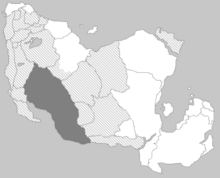Anathic: Difference between revisions
No edit summary |
(Updated infobox) |
||
| (3 intermediate revisions by 3 users not shown) | |||
| Line 6: | Line 6: | ||
|name = Anathic | |name = Anathic | ||
|nativename = Á h-Ænæþ | |nativename = Á h-Ænæþ | ||
|pronunciation = | |pronunciation = oɑ̆ ˈhanaθ | ||
|region = Ór | |region = Ór | ||
|states = Rathstead | |states = Rathstead | ||
| Line 16: | Line 16: | ||
|fam3 = Old Anathic | |fam3 = Old Anathic | ||
|dia1 = Standard Anathic | |dia1 = Standard Anathic | ||
|map = AnathicOr.png | |map = AnathicOr.png | ||
|mapcaption = Map showing areas where Anathic is spoken as a native language (dark grey) and as a common second language (striped). | |mapcaption = Map showing areas where Anathic is spoken as a native language (dark grey) and as a common second language (striped). | ||
| | |script1 = Latn | ||
|notice = IPA | |notice = IPA | ||
|creator = User:Fiora | |||
}} | }} | ||
'''Anathic''' (''Á h-Ænæþ'', pronounced /oɑ̆ ˈhanaθ/) is an [[w:a priori|a priori]] artlang influenced by [[w:Old English|Old English]], [[w:Celtic languages|the Celtic languages]] and [[w:West_Scandinavian_languages#Family_tree|the West Scandinavian languages]]. Anathic is the most widely spoken language in Ór (''Anathic: Á h-Ór''), a fictional continent. It is the native language of approximately 660,000 people leaving in Rathstead, the desert region in the south-west. It is spoken as a minority language across many other regions where it is also often taught as a second language. | '''Anathic''' (''Á h-Ænæþ'', pronounced /oɑ̆ ˈhanaθ/) is an [[w:a priori|a priori]] [[artistic language|artlang]] influenced by [[w:Old English|Old English]], [[w:Celtic languages|the Celtic languages]] and [[w:West_Scandinavian_languages#Family_tree|the West Scandinavian languages]]. Anathic is the most widely spoken language in Ór (''Anathic: Á h-Ór''), a fictional continent. It is the native language of approximately 660,000 people leaving in Rathstead, the desert region in the south-west. It is spoken as a minority language across many other regions where it is also often taught as a second language. | ||
| Line 114: | Line 114: | ||
{| border="1" cellpadding="1" cellspacing="1" class="bluetable lightbluebg" style="width: 330px; text-align:center;" | {| border="1" cellpadding="1" cellspacing="1" class="bluetable lightbluebg" style="width: 330px; text-align:center;" | ||
|- | |- | ||
! !! Front !! Central!! Back | |||
|- | |- | ||
! Close | |||
|align=center| || ||align=center| u: | |||
|- | |- | ||
! Near-close | |||
|align=center| ɪ || ||align=center| ʊ | |||
|- | |- | ||
! Mid | |||
|align=center| ɛ ||align=center| ə, ø: ||align=center| ɔ | |||
|- | |- | ||
! Open | |||
|align=center| a || ||align=center| ɑ | |||
|- | |- | ||
|} | |} | ||
| Line 137: | Line 141: | ||
[[category:Conlangs]] [[category:Languages]] | [[category:Conlangs]] [[category:Languages]] | ||
[[category:Artlangs]] | |||
Latest revision as of 18:21, 5 July 2021
This article is private. The author requests that you do not make changes to this project without approval. By all means, please help fix spelling, grammar and organisation problems, thank you. |
This article is a construction site. This project is currently undergoing significant construction and/or revamp. By all means, take a look around, thank you. |
| Anathic | |
|---|---|
| Á h-Ænæþ | |
 | |
| Pronunciation | [oɑ̆ ˈhanaθ] |
| Created by | Fiora |
| Native to | Rathstead |
| Native speakers | 3,040,000 (1870 OY) |
Órean
| |
Dialect |
|
Map showing areas where Anathic is spoken as a native language (dark grey) and as a common second language (striped). | |
Anathic (Á h-Ænæþ, pronounced /oɑ̆ ˈhanaθ/) is an a priori artlang influenced by Old English, the Celtic languages and the West Scandinavian languages. Anathic is the most widely spoken language in Ór (Anathic: Á h-Ór), a fictional continent. It is the native language of approximately 660,000 people leaving in Rathstead, the desert region in the south-west. It is spoken as a minority language across many other regions where it is also often taught as a second language.
History
Phonology
Consonants
| Bilabial | Labio-dental | Dental | Alveolar | Post-alveolar | Palatal | Velar | Labio-velar | Lateral | Glottal | |
|---|---|---|---|---|---|---|---|---|---|---|
| Nasal | m | n | ŋ | |||||||
| Plosive | p b | t d | k g | |||||||
| Fricative | f v | θ ð | s | (ʃ) | x ɣ | h | ||||
| Approximant | j | w | l | |||||||
| Trill | r |
(Allophones in parentheses)
Vowels
Monophthongs and long vowels
| Front | Central | Back | |
|---|---|---|---|
| Close | u: | ||
| Near-close | ɪ | ʊ | |
| Mid | ɛ | ə, ø: | ɔ |
| Open | a | ɑ |
Diphthongs
- [uĭ]
- [iə̆]
- [ɛĭ]
- [oe]
- [əʉ]
- [oɑ̆~oə̆]
- [eo]
- [aĭ]


